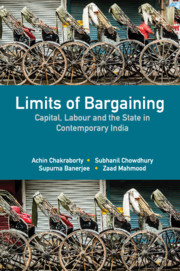Book contents
- Frontmatter
- Contents
- List of Tables
- List of Figures
- Preface
- 1 Contextualising Trade Unions and Collective Bargaining
- 2 Collective Bargaining in India: An Overview
- 3 Everyday Processes of Collective Bargaining in West Bengal
- 4 Industrial Stagnation due to ‘Labour Militancy’? A Critical Look at the Macro Evidence
- 5 Trade Unions and Working-Class Politics in Contemporary West Bengal
- 6 The State and Collective Bargaining
- 7 Conclusion
- References
- Index
7 - Conclusion
Published online by Cambridge University Press: 05 June 2019
- Frontmatter
- Contents
- List of Tables
- List of Figures
- Preface
- 1 Contextualising Trade Unions and Collective Bargaining
- 2 Collective Bargaining in India: An Overview
- 3 Everyday Processes of Collective Bargaining in West Bengal
- 4 Industrial Stagnation due to ‘Labour Militancy’? A Critical Look at the Macro Evidence
- 5 Trade Unions and Working-Class Politics in Contemporary West Bengal
- 6 The State and Collective Bargaining
- 7 Conclusion
- References
- Index
Summary
This study has examined the role of trade unions and the collective bargaining institutions in the urban labour market of West Bengal (WB) within an analytical framework that views capital–labour relations as an outcome of the interplay of the triad of market, technology and the state with its collective bargaining institutions. The fact that the power of the trade unions in influencing the capital–labour relations has declined throughout the world is now a commonplace observation. In an increasingly globalised world, nation states seem to have been competing to take away the hard-earned gains of people and making various attempts to level the organised labour down to the predicament of unorganised workers. There is often a ring of inevitability around this argument favouring levelling down, as if it is driven by forces outside our control. Trade union action in pursuit of the interests of the organised labour is widely believed to create a privileged class of workers out of proportion with the Indian realities, detracting from the all-important goal of economic growth. There has been a long tradition in the discussions on Indian trade unionism that tends to emphasise ‘responsible trade unionism’ vis-à-vis its other—supposedly ‘irresponsible’ or ‘destructive’. The literature repeatedly makes contrasts between the ‘adversarial’ roles that the trade unions are believed to play and the ‘accommodating’ roles that they are expected to play.
Against the backdrop of a steadily declining share of the organised industrial sector in WB vis-à-vis India, we have relooked into the so-called labour militancy argument in explaining the decline. A close examination of the secondary data and application of quantitative techniques reveal a kind of path dependence of industrial development (relative decline, to be precise) in the state with an initial trigger in the form of freight equalisation policy and contracting public sector investment back in the past. The rise of adversarial trade unionism of the past, if we accept this characterisation of earlier trade unionism in WB, might be a consequence rather than a cause of the relative decline.
- Type
- Chapter
- Information
- Limits of BargainingCapital, Labour and the State in Contemporary India, pp. 129 - 131Publisher: Cambridge University PressPrint publication year: 2019



